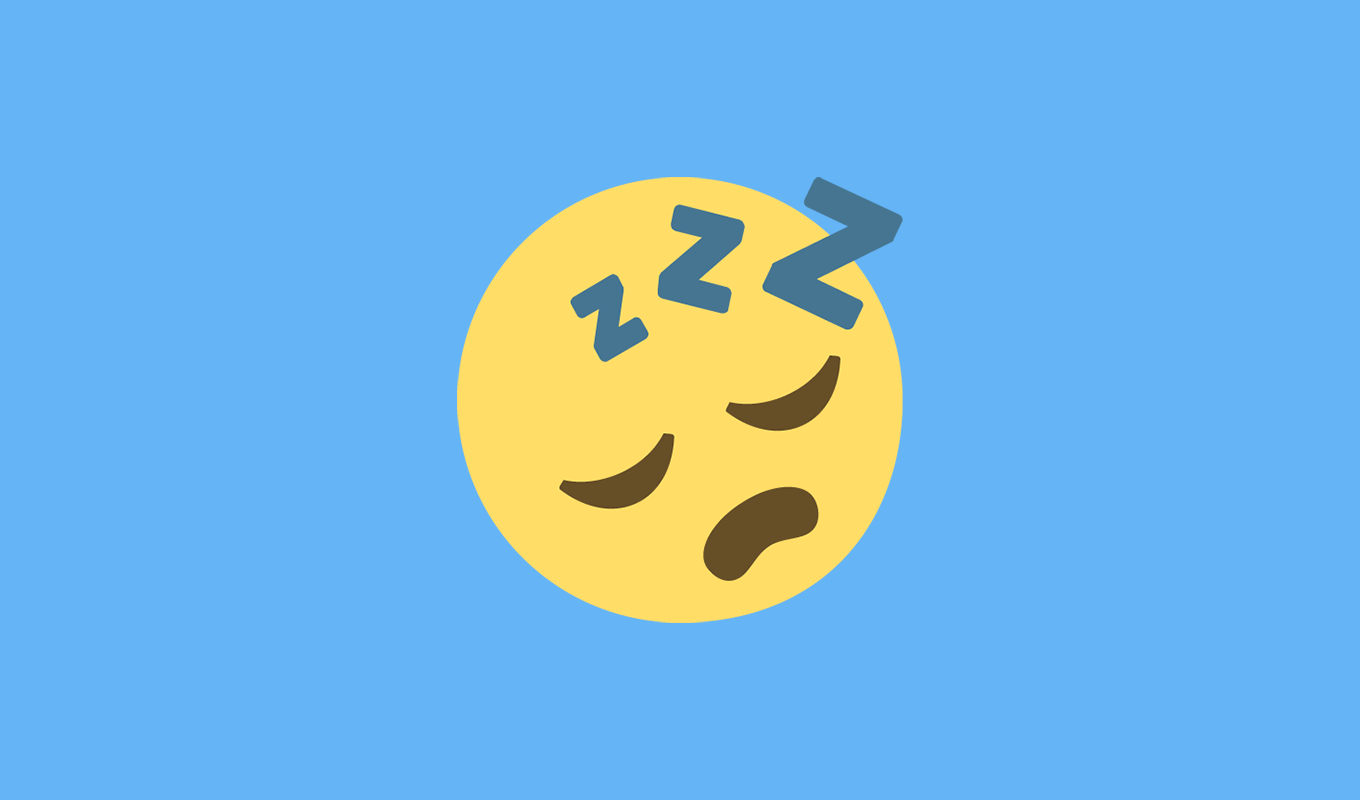Here is a question I see a lot in productivity forums: “How can I get by on less sleep so I have more time to work?”.
In this post I want to show you why that is the wrong question to ask and going down this road will make all your productivity problems worse. But more importantly, I will show you what to ask instead (“How can I improve my sleep quality?” ) and give you a big overview on how to do exactly that.

How sleep deprivation hurts your productivity
Sleep can definitely seem like a productivity robber. All those hours just lying around in bed when we already feel like there aren’t enough hours in the day. Ugh.
But in reality, sleep is really productivity’s best friend.
If you have ever been heavily sleep deprived you know how utterly useless your brain becomes on too little sleep.
And most of us are in a perpetual state of sleep deprivation, ranging from mild to severe. You might be so used to your current state of being that you don’t even remember how it feels to be fully rested.
Being sleep deprived means your brain is not functioning at maximum capacity which hurts your productivity every minute of the day. Everything is just a bit harder to do, takes a bit longer… it really adds up.
Furthermore, sleep deprivation is very stressful for your body. Stress inhibits your pre-frontal cortex, the part of your brain where your “willpower” comes from. If you are struggling to get started on tasks and can’t seem to stop procrastinating, your sleep habits have something to do with that too.
Focus on quality not just quantity
A common misconception about sleep is that it is mostly about quantity. We obsess over how many hours of sleep we get every night. And if we fall short of the magical “8 hours”, we feel even more stressed and worry about how we could possibly sleep that much and still have time to get everything done in the day.
But in reality sleep quality is really where we should put our focus.
Getting 6 hours of great quality sleep will do so much more for you than getting 8 hours of poor quality sleep. (BTW not everyone even needs 8 hours of sleep every night)
Sleep is a complex process and your brain and body performs a lot of different activities during sleep to restore you. Poor quality sleep means while you are technically “asleep” your body is not able to perform these tasks efficiently. Hence, you wake up not feeling restored.
If you think about it, sleeping while not getting good quality sleep is an incredibly inefficient use of your time. It is still better than not sleeping at all of course, but you really want to get maximum bang for your buck when you sleep and you do that by increasing your sleep quality.
How to increase sleep quality
In this post I want to give you an overview with the best tips on how you can improve your sleep quality so you can maximize your brain function and hence your productivity. By focusing on sleep quality you might even be able to reduce the hours of sleep you need as the entire process is more efficient.
Oh and if that is not enough… the increased overall energy, lift in mood and massive health benefits you will get from optimizing your sleep will be a nice bonus.
Since sleep is a huge topic I tried to keep each point really short to give you a nice overview over all the factors that affect sleep. If there is anything you want to get more details on, let me know in the comments!
So let’s jump into it and get your sleep optimized.
Consistent sleep schedule
One of the most important things you can do to improve sleep quality is sticking to a consistent sleep schedule, every day. The more you go to bed at the same time and wake up at the same time, the more efficient and more restoring your sleep becomes.
Optimize light exposure
Make sure you sleep in absolute darkness. Even tiny LED lights on electronics in the room can disturb sleep (electronics might disrupt sleep through other means as well, so best to keep it all out of the bedroom).
Use blackout curtains to block any street light or even moon light from outside. If you can’t get your room to be completely dark, try using a sleeping mask.
But light can interrupt your sleep before you go to bed. Staring into a digital screen (lots of blue light) will prevent your brain from making melatonin, a really important hormone that regulates sleep and is needed for good quality sleep.
As a rule, when the sun goes down, start turning down the lights inside too. Avoid using your phone, PC or TV after dark entirely or use blue light blocking glasses (those orange tinted glasses you might have seen some biohackers wear).
Timing
Your body runs on a schedule. There are specific functions your body performs during sleep at specific times.
If you go to bed way past it is dark (e.g. midnight or later) you are missing out on some of these tasks.
In other words, when you sleep matters. Getting 7.5 hours of sleep starting at 10pm will be much better for you and restore you more than 7.5 hours of sleep starting at 1am.
Start to wind down when it is dark and go to bed so ideally you are asleep at 10pm.
Temperature
Ideally your sleep environment is several degrees colder than your regular environment. When you get ready to go to sleep the sudden drop in temperature is an important clue for your body that it is time to wind down.
I keep the bedroom unheated for example and always sleep with an open window, no matter how cold it is outside.
Timed Exercise
Exercise really helps to increase the quality of your sleep. But be mindful of when you exercise during the day.
Movement is another clue for your body that tells the difference between day/active and night/inactive time. Movement is a tool you can use to entrain your natural circadian rhythm.
Ideally you start the day with movement and move throughout the day and then wind down when it gets dark. This will lead to the best quality sleep in the long run.
We naturally have higher cortisol in the morning (which wakes us up) and cortisol should drop throughout the day.
Intense exercise raises cortisol. So exercising in the morning can be used to stabilize a healthy cortisol curve.
Many people have a messed up cortisol curve, which is due to imbalanced lifestyles and chronic stress. Some people have a backwards curve with low cortisol in the morning (trouble getting up/waking up) and too high cortisol at night (trouble falling asleep, wired and tired feeling). Others barely produce any cortisol anymore due to prolonged periods of chronic stress.
Noise
Noise throughout the night can disrupt sleep. Make sure you sleep in a completely quiet environment (e.g. turn off the TV). Use earplugs or white noise machines to cancel out any noise you have no control over (street outside).
Ditch the alarm
Ideally, you wake up every day without the aid of an alarm clock. This ensures you are not waking up in the wrong part of your sleep cycle which can leave you feeling off all day. As you optimize your sleep through lifestyle habits this will become entirely possible. When your sleep is optimized you will be able to wake up at the same time every day without the help of a clock.
Watch those substances (alcohol, nicotine)
There are many substances that severely interfere with the quality of our sleep, three of the most common offenders are alcohol, nicotine and caffeine.
Alcohol
Many people mistakenly believe alcohol helps you sleep, and while it might make you fall asleep faster, it interrupts REM sleep which leads to poor concentration and drowsiness the next day. Alcohol is poison for your brain. If you want optimize your brain function, I would seriously consider ditching alcohol completely or at least make it not part of your regular life.
Nicotine
Studies have shown that smokers spend less time in deep sleep during the night. This is likely due to nicotine being a stimulant.
Caffeine
Just like nicotine, caffeine is a stimulant and disrupts sleep. Even when you don’t notice an effect on your sleep when consuming sleep, sleep quality is lowered when caffeine is still in your system. People metabolize caffeine at different rates so it is difficult to say an exact cut-off time for drinking caffeine. Since caffeine can be another tool to set your circadian rhythm it is best to only drink it in the morning after waking up or not drink it at all (caffeine has other detrimental health effects beyond sleep).
Go to bed when tired
If you go to bed without feeling sufficiently tired, you will spend a lot of time frustrated in bed of why you are not falling asleep and wasting a lot of time in the process.
You want to establish a sleep schedule where you go to bed when you are feeling sleepy so it takes you only about 10m to fall asleep. Once you fix your sleep and establish a consistent routine this will happen automatically.
If you are currently going to bed much later than you want, simply going to bed earlier and earlier won’t work well. What you want to do instead is go to bed later for a few days (essentially sleep depriving yourself) so that you get so tired that you can easily fall asleep early in a few days.
Don’t mind the interruptions
Waking up during the night is actually quite normal. But many people don’t know that and get upset when they wake up at night. The worrying over having woken up can then keep them up for a long time.
So remember that waking up at night is normal and just let it go so you can fall back asleep in no time.
Night Routine
If we go to bed stressed and our thoughts running high, we keep this going throughout the night. So try to incorporate a nice evening routine focused on turning on that flight and fight response so you can go to sleep in a relaxed state.
Some ideas:
- taking a bath (add Epsom salts for a bonus, magnesium is highly relaxing)
- taking a slow walk outside
- stretching
- meditating
- cuddling in candle light
- reading something non-stimulating (make sure it’s not on a device that emits a lot of light)
If none of these activities sound appealing, at least try to avoid highly stimulating activities before bed (e.g. video games, exciting movies/shows).
Stay hydrated
Being hydrated is super important if you want your body and especially your brain to function well. But during the night you can’t drink, so you have to make sure you are going to bed well hydrated by drinking enough throughout the day.
Hydrate with a big glass of warm water (add fresh lemon juice for a bonus ) first thing in the morning, because we all wake up dehydrated. And even a little bit of dehydration can make it hard to focus and even permanently damage your brain cells.
Don’t eat before bed
Your body is really busy restoring your cells and cleaning up your brain during the night. Don’t burden it with food it has to digest or it can’t do the other jobs as well. A good rule of thumb is to not eat anything for at least 2 hours before going to bed, better 3-4 hours.
Ditch the sleeping pills
Sleeping pills might make you feel like they are helping you sleep, but they disrupt the quality of your sleep terribly and have serious long-term risks as well. The goal should always be to get to a healthy sleep pattern naturally so you can ditch the pills.
Fix sleep apnea
About 1-6% of adults suffer from sleep apnea. If you never feel refreshed after sleeping and snore, get checked if you have sleep apnea. Being overweight is a big risk factor and losing weight can often dramatically improve this condition so you can get a restful night of sleep. Alcohol also makes sleep apnea worse in addition to interrupting REM sleep.
Also published on Medium.


